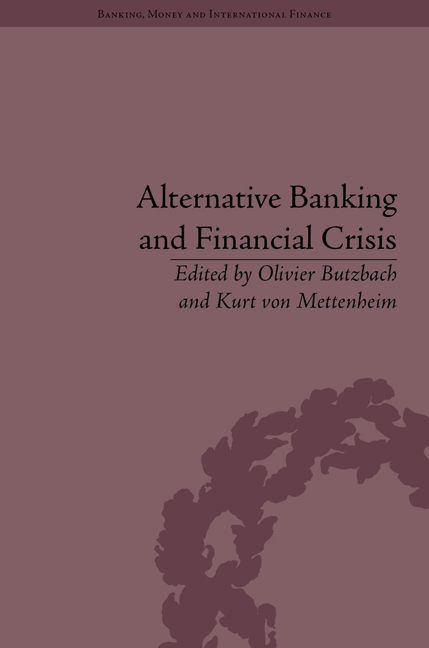Book contents
- Frontmatter
- CONTENTS
- Acknowledgements
- List of Contributors
- List of Figures and Tables
- Introduction
- Part I Historical Context and Conceptual Framework
- 1 Alternative Banking History
- 2 The Comparative Performance of Alternative Banks before the 2007–8 Crisis
- 3 The Counter-Cyclical Behaviour of Public and Private Banks: An Overview of the Literature
- 4 Explaining the Competitive Advantage of Alternative Banks: Towards an Alternative Banking Theory?
- Part II Comparative Country Cases
- Conclusion
- Notes
- Index
3 - The Counter-Cyclical Behaviour of Public and Private Banks: An Overview of the Literature
from Part I - Historical Context and Conceptual Framework
- Frontmatter
- CONTENTS
- Acknowledgements
- List of Contributors
- List of Figures and Tables
- Introduction
- Part I Historical Context and Conceptual Framework
- 1 Alternative Banking History
- 2 The Comparative Performance of Alternative Banks before the 2007–8 Crisis
- 3 The Counter-Cyclical Behaviour of Public and Private Banks: An Overview of the Literature
- 4 Explaining the Competitive Advantage of Alternative Banks: Towards an Alternative Banking Theory?
- Part II Comparative Country Cases
- Conclusion
- Notes
- Index
Summary
Introduction
The literature on public banks is quite varied but can be broadly divided into three categories: a) research on the relationship of public banks and economic growth and development; b) research that compares the performance of public and private banks, in terms of profitability, efficiency, outreach, etc.; and c) studies that assess the lending behaviour of public banks through the business cycle or during crisis periods. In this chapter we propose an overview of the literature focusing on the third aspect, namely the counter-cyclical lending behaviour of public banks over the business cycle and/or in crisis times. This issue has come to attract more attention since the onset of the recent financial crisis and will probably receive even more attention once the difficulties in reigniting growth become more evident, especially in Europe. As is widely discussed currently, the austerity measures in Europe have proven to be contractionary and may probably lead in the future to a reconsideration of alternative non-orthodox policy measures to stimulate private and public investment, reduce unemployment and spur economic growth.
In what follows, we start by reviewing the empirical papers that study the lending behaviour of public banks over the business cycle. In the next section, we consider the literature that investigates the lending response of banks to an economic crisis.
- Type
- Chapter
- Information
- Alternative Banking and Financial Crisis , pp. 43 - 50Publisher: Pickering & ChattoFirst published in: 2014



